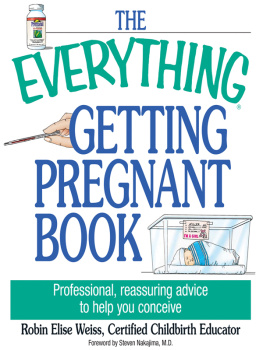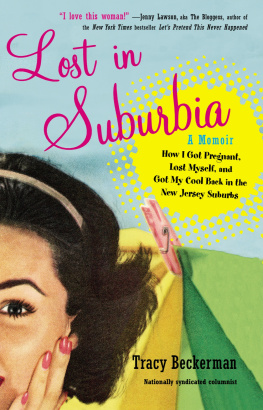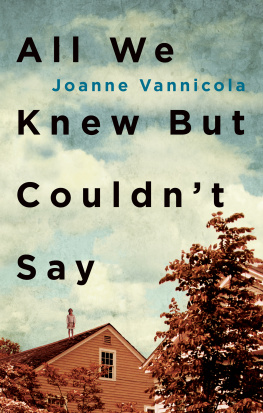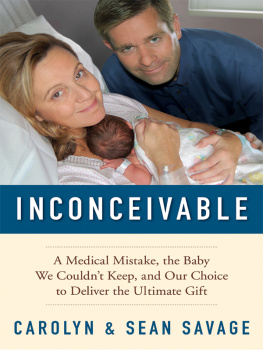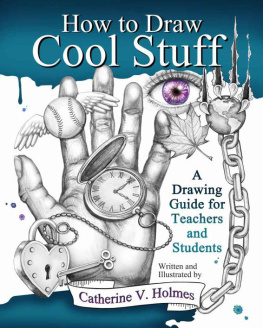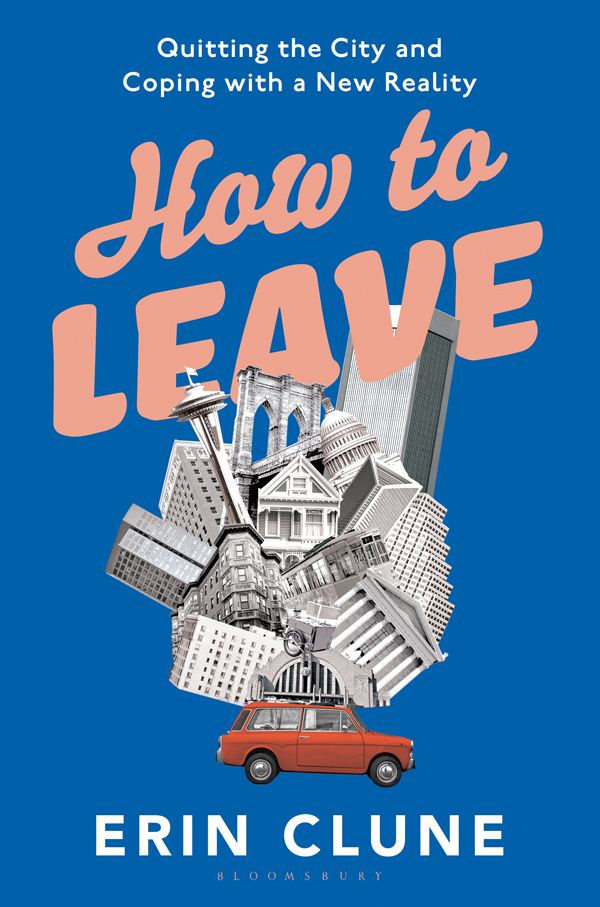Contents
Guide
Pagebreaks of the print version


for Mike


CONTENTS
This book is about leaving. Its not about leaving your husband for a woman. Or leaving the country because the wrong candidate was elected. If you want to do either of those things, I hope you get a good lawyer. And a different book. This book is about the kind of leaving wherebecause of work or family or health care or some other real-life reasonyou decide to leave the fabulous and familiar place you call home and move someplace else.
Moving is traumatic under the best of circumstances. Its even more emotionally fraught when you still love your home and cant imagine living anywhere else. I felt that way about New York City. Leave?! It has everything! High-rises. High fashion. Flash mobs. Actual mobs. Identity pride parades. Bike-delivered food. Tiny trash tornadoes on a windy day. That man who roams around midtown with a cat on his head. Its the unique, quirky aspects of daily life in the city that New Yorkers cherish most. Let me ask you this: Did you ever stand in Times Square on New Years, freezing your ass off for ten hours because your boyfriend said you had to do it, just once? If the answer is yes, I hope you broke up with that guy. Nobody has to do that, not even once.
I use New York as an example because it was my beloved home. But as this book demonstrates, people have special connections to so many other places. No matter where you live, or in what time zone you watch New Years on TV, you can relate to Frank Sinatras triumphant words: If I can make it there, Ill make it anywhere! Maybe your version of making it was cooking vegan spring rolls and taking long hikes in Seattle. Maybe it was eating barbecue and going to zombie film festivals in Austin. Or maybe you followed your heart to Denver to spend every weekend shredding it on the slopes then sitting in traffic on I-70. Maybe the traffic wasnt part of the dream. The point is, when you find the place where you find yourself, you never want to leave.
Until you do. At which point, everyone who ponders leaving their favorite place suddenly starts to freak out: Wait, can I really make it anywhere ? After two decades in San Francisco, does anywhere include a tract housing community in Oklahoma City? After ten years in Minneapolis, does anywhere include a gated golf community in a quiet suburb of Boise? For New Yorkers: Isnt everywhere in flyover countrywith the exception of a few award-winning restaurants in Chicagopretty much always asleep? WTF, Frank Sinatra! Does Boise even have suburbs?!
Im not sure about the answer to that last question, but the overall answer is still yes. You can make it anywhere, even if that place is somewhere in Idaho, with its incomprehensibly small Canadian border and its mythological suburbs. You can leave a place that makes you feel alive and relocate to a place that is routinely described as livable . How do I know this? Because after living in New York for almost twenty yearsminus one disturbing year in Rhode IslandI moved back to the Midwest with a husband, two children, better hair, and exactly two rooms of furniture. And I survived to write a book about it.
After combing through decades of largely reliable memories, I felt compelled to turn my personal story into a practical coping guide, designed for anyone who may be facing a new reality. Countless social scientists have studied the intricate emotional factors involved in moving. Most of that research, while probably very interesting, does not appear in this book. Instead, its inspired by the wisdom that Ive been acquiring most of my life. Like, since I was a baby. Maybe even since I was a fetus, preparing to migrate south. Most important, I grounded this book in my own experience of leaving New York and moving back to my hometown of Madison, Wisconsin, a town so pleasant and livable I couldnt wait to get the hell out. As a teenager, I once stomped out to the back porch, where my mom and her friends were drinking iced tea, and boasted that I would rather die than grow old in Wisconsin drinking iced tea on a porch. Great , my mom thought, rolling her eyes, how soon can you start packing?
Eventually, I did move away. After going to college in California, then working for a few years in Washington D.C., I landed in New York City. It was pretty different from my parents back porch. For one thing, it was bigger. Three of its five boroughs, put together, contain more people than the entire state of Wisconsin. More people visit Times Square on a busy day than officially reside in my entire hometown! Also, most people in New York dont even have porches. They have stoops.
Yet if that was the full story, I wouldnt be here, promising to fix your life. The truth is that I barely escaped that tragic, iced teadrinking fate, only to find myself back on the same exact porch twenty years later. I still dont like iced tea. Id always just rather have coffee. But the process of returning has taught me some new things. One is that people sometimes need support when they move. Moving is not as mathematically straightforward as, say, lowering the carb ratio in your diet, or losing your baby weight. Most women I know just put that little walking bracelet on and the pounds fall right off. And everyone knows how good statistics are at changing irrational behavior. Ever told a heavy smoker how many more years theyd live if they just stopped sucking on those tar sticks? Its like a magic nicotine patch made of numbers! Right? But moving away, and coping with the reality of your life in a new place, can be a slightly more complex endeavor.
Dont get me wrong: This program is not a panacea. It should not be taken in place of lifesaving medication. It wont cure your acid reflux or help you navigate through Paducah, Kentucky, during heavy rainfall. Also, this book contains very few, if any, pithy motivational phrases like Life is an adventure . Im not sure how people who say things like that actually have friends. If anyone had said that to me when I was trying to figure out how to leave New York, I wouldve punched them. Or at least posted a throw-up emoji on their timeline.
Rather than inspiring you, this book will help you see the world around you more clearly so you can manage your expectations. You need to know that even if you always use the GPS, you will still sometimes get lost out there in the wilds of the suburbs. Like when youre driving in the sticks, looking for a corn maze, and suddenly find yourself on an unmarked road because the Silicon Valley dude who programmed the satellite thinks everyone in Wisconsin is Amish. You need to know that outside of large urban areas, they have very few billboards, exactly not any of which feature David Beckham in his underwear. Youll be lucky to see a group of fully clothed middle-aged men standing awkwardly above a caption that reads HOLIDAY GREETINGS FROM THE MANAGEMENT TEAM AT YOUR FRIENDLY NEIGHBORHOOD CREDIT UNION. And you need to know that you probably cant just catch a taxi. You can maybe order a Lyft, and in twenty-five minutes, someone you went to high school with will swing by in a flatbed truck on his way to a meat raffle. At which point, you may decide to tag along, because duh, meat raffles are everything.





